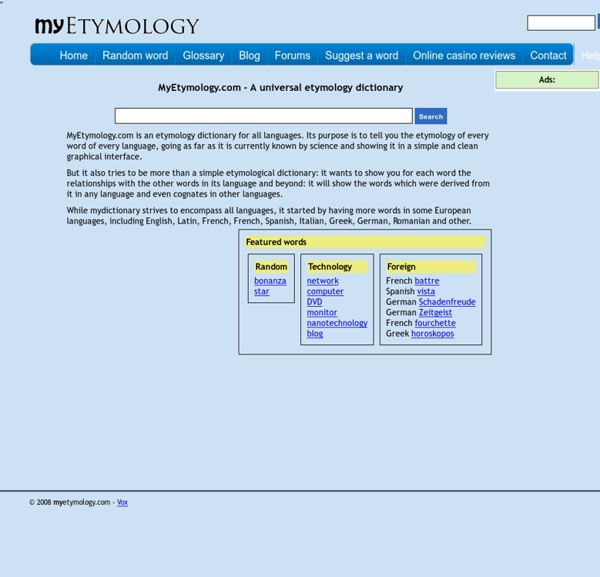European Maps Showing Origins Of Common Words
U.S. playwright Rita Mae Brown said: "Language is the road map of a culture. It tells you where its people come from and where they are going." That quote comes to mind looking at these fascinating European etymology maps of various commons words posted by reddit user sp07, which provide a kind of cultural commentary on Europe.
Dicionário Priberam da Língua Portuguesa
Dicionário Priberam da Língua Portuguesa Este site utiliza cookies. Ao continuar no site está a consentir a sua utilização. Saiba mais... Definições
FASTEN SEAT BELTS 2 - Travel by Continent - Europe
Fasten Seat Belts, a light hearted guide to avoid misunderstandings while travelling. An innovative way to learn languages and pick up cultural tips. Travel by Continent / Europe
What Languages Are the Hardest to Learn?
1036 26ShareNew There's a reason why most American students start with French or Spanish as a second language. These romance languages are somewhat similar to English and require (relatively) less time to learn than most. Using information from the Foreign Service Institute, this infographic from Voxy categorizes 23 languages by the level of difficulty.
Scientists say the ways humans describe nature transcends culture and geography
Kampala, Uganda At a bustling Kampala market, Desire Karakire listens to a group of young men express their frustrations over the state of their country. Like most of their peers, they’re underemployed and extremely poor—and they feel the only way the situation will change is through violent revolution. “Leadership involves blood,” says Richard Ssenyoga, 23.
Lexical Distance Among the Languages of Europe « Etymologikon™
Posted by Teresa Elms on 4 March 2008 This chart shows the lexical distance — that is, the degree of overall vocabulary divergence — among the major languages of Europe. The size of each circle represents the number of speakers for that language. Circles of the same color belong to the same language group.
What's the best way to teach languages?
Alex Rawlings was a language teacher's dream. He fell in love with languages when he was eight and learnt Greek, then German, then Dutch. Now, an undergraduate at Oxford, he is the UK's most multi-lingual student, speaking 11 languages.
8 Practical Ways to Learn All the Foreign Language Vocabulary Needed for Conversational Fluency
Did you know that 1,000 words can get you a long, long way in a foreign language? It might not seem that easy when you’re looking at the raw numbers. The Oxford English Dictionary includes more than 170,000 English word entries.
How to identify any language at a glance
Sign Up for Our free email newsletters Thanks to globalization, it's very likely that at some point you've found yourself faced with a line of text written in a language you couldn't quite identify.
Explicit cookie consent
JOHNSON is a fan of the Freakonomics books and columns. But this week’s podcast makes me wonder if the team of Stephen Dubner and Steven Levitt aren’t overstretching themselves a bit. “Is learning a foreign language really worth it?”
How to quickly learn declensions and conjugations
I’m definitely a weirdo. I enjoy learning grammar! Declensions, conjugations, possessive pronouns. I love them all! And there is a good reason for that! They are simply one of the easiest things to learn in most languages!
Reverse Dictionary
<div id="needs_javascript"><center><b>Note: The new Reverse Dictionary requires JavaScript.</b><br /><img src="/img/a.gif?q=omg_a_user_without_js"> If you have disabled JavaScript in your browser, please <a href=" it for this site</a> or use the <a href="/?w=entersearchhere&loc=revfp_legacy">old version of the reverse dictionary</a> here.
ILTEC - Projecto Divling - CD 2006
CD2 - Análises e Materiais (2006) No dia 7 de Novembro de 2006, o ILTEC e a Fundação Calouste Gulbenkian organizaram um Colóquio sobre Políticas de Língua e Diversidade. Foi apresentado, nesse dia, o segundo CD-ROM do projecto Diversidade Linguística na Escola Portuguesa que contém: Conteúdos do CD



